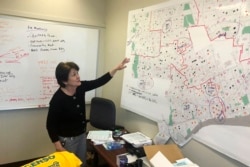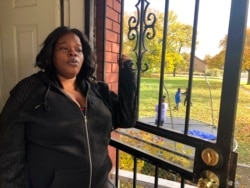Officials know there will be problems when the United States Census Bureau starts counting people next year in Detroit.
The city has tens of thousands of empty houses, poor internet connection and many poor people. These conditions are expected to make it difficult to get a truthful number.
There are other problems for the nationwide count also. People have moved away from many towns in the middle of the country. Cities in the south and southwest, however, have large numbers of immigrants and new arrivals from other parts of the country.
The Associated Press has examined government census information. It has determined that about 25 percent of the country’s population live in areas that are hard to count. This includes a majority of people in cities such as Atlanta, Cleveland, Dallas, Los Angeles, Milwaukee, Memphis, Tennessee and Fresno, California.
Getting a truthful count is very important because the census helps decide where $1.5 trillion in federal money will go. It also decides which states will gain or lose congressional representation.
“There is nothing more important…than reaching the hard to count,” Census Bureau Director Steven Dillingham told lawmakers last summer.
In the case of Detroit, the city has started to grow again. The renewal includes improvements to downtown buildings, new hotels and growing arts neighborhoods. But the renaissance has done little for some people who live in poverty. Many do not trust officials after years of racial problems.
Racial conflict in the 1950s and 1960s was part of the reason that many people left the city. Its population fell from 1.8 million to 670,000.
Annette Brock lives northeast of the city’s center. She said some people see no connection between answering questions from the government and improving their lives.
“Everybody else outside of us gets help before we do,” Brock said.
Nationwide, the Census Bureau predicts that 60.5 percent of people will answer its questions.
About 70 percent of people who live in Detroit returned their 2000 Census forms. That percentage fell to 64 percent in 2010, when the national rate was 74 percent.
The city losses $2,000 to $5,000 each year for every uncounted person, said Victoria Kovari. She is the director of Detroit’s 2020 Census Campaign.
City census workers have gone to nearly 130,000 homes in neighborhoods that were under-counted in the last census. They have spoken with more than 26,000 people. But Kovari is still concerned. For the first time, the Census Bureau would like citizens to answer questions online. But, the agency estimates that 30 percent of Detroit homes do not have an internet connection. That is twice the national average.
The Census Bureau sends workers to homes that do not answer the official form. But often they visit empty homes.
Minority groups remain hard to count
Diana Elliott is an Urban Institute researcher who co-wrote a report last summer. The report estimated that from 900,000 to 4 million people could be missed in the national census. Elliott also believes the black population will be undercounted. Almost 80 percent of Detroit is African-American.
Some researchers have learned that Latinos, African-Americans, non-English-speaking immigrants and children under five years old are the most difficult to count. Other groups that are hard to count include tribal members, nontraditional families and people with informal living arrangements.
Experts say the Trump administration’s effort to put a citizenship question on the census form may frighten immigrants who live in the country illegally. The question will not be included in the 2020 census.
California and New Mexico have some of the nation’s largest Latino neighborhoods. In those states, over 40 percent of the population lives in hard-to-count neighborhoods.
For census workers, some states are easier to count. Vermont, Maine and West Virginia have some of the highest numbers of white residents and older people. They are more likely to fill out census forms. There, less than 5 percent of the population lives in hard-to-count neighborhoods.
To make sure people understand the importance of the 2020 census, California is spending an estimated $187 million on advertising and events. It is paying neighborhood leaders to work in their communities. California census officials also are paying experts whose only job is to get to 15 hard-to-count groups, including farm workers, the homeless and people without the internet.
“You really have to understand the… barriers that exist,” said Ditas Katague. He is director of the California Complete Count-Census 2020 Office.
I’m Dorothy Gundy. And I'm Susan Shand.
The Associated Press reported this story. Susan Shand adapted it for VOA Learning English. Mario Ritter, Jr. was the editor.
Write to us in the Comments Section or on our Facebook page.
_________________________________________________________________
Words in This Story
Census Bureau – n. an agency of the government whose job it is to count the US population every 10 years
determine – v. to find out or to make a discovery
renaissance – n a rebirth or renewal
urban – adj. in a city, not the country







